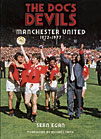 Manchester United 1972-1977
Manchester United 1972-1977
by Sean Egan
Cherry Red Books, £17.99
Reviewed by Joyce Woolridge
From WSC 290 April 2011
"We wanted a gentleman as well as a good football manager," pronounced Manchester United chairman Louis Edwards on appointing Dave Sexton, simultaneously delivering a hefty backhanded swipe at the previous incumbent, Tommy Docherty. In this heavyweight volume (literally – it runs to 578 closely packed pages with appendices of player biographies and statistical tables), Sean Egan provides more than ample evidence for the case for and against Edwards's verdict on the United manager who has probably divided opinions most sharply, both during his time at the helm and since.
Five lengthy sections deal with each of Docherty's rollercoaster seasons at Old Trafford. These draw upon meticulous, extensive research in the press and interviews with some ex-players and other personnel. Captain Martin Buchan's dry observations frequently offer a bathetic, deflationary counterpoint to the plaudits of Docherty enthusiasts such as Gordon Hill and Colin Waldron. Lesser lights, such as Peter Coyne, holder of the Manchester schools goals record, who scored on what was his debut and sole first team appearance for United, are given space to add a different and often original perspective.
Frank Blunstone, the youth team coach, rather than Docherty himself, largely puts the coaching staff viewpoint but, given that Docherty has said his piece elsewhere several times in his autobiographies and in the papers, this is possibly a strength rather than a weakness. Such is the thoroughness of the narrative that every match is discussed and the set pieces, including the 1976 and 1977 Cup finals, are presented in revealing detail. The pros and cons of the players, from the bit parts like Coyne, Tony Young and others to those who were regular participants in Doc's two most regular line-ups, are assessed judiciously.
Despite its comprehensive nature, there are no real surprises in Egan's overall judgement of Docherty's talents and limitations as a manager. Bouncing back from relegation, Docherty created a young team whose tallest outfield player scraped 6ft and which produced swashbuckling football while playing 4-2-4, but also a squad with the depth of tissue paper. The latter was the result of Docherty's anxiety to balance the books and, sometimes, an unwise and premature desire to ship out those he deemed surplus to requirements.
Alex Stepney was twice told he would never play for the first team again, but was still the number one goalkeeper when Docherty was dismissed. After two seasons in the First Division, Docherty had won many friends, but also alienated those he had dispensed with callously. That Docherty was unreliable, inconsistent and impulsive is well known, though the extent of his quixotic behaviour as shown here is occasionally staggering. Given the circumstances, his dismissal 44 days after the Cup victory was unavoidable.
There are many nice touches: Foul magazine dubbing Big Jim Holton "The Big Bopper", Alex Stepney's spell as penalty taker and the loudspeaker announcement after a bomb warning in a 1975 match against Spurs asking the Old Trafford crowd to look around for suspicious packages. Meanwhile Ron Atkinson, with two FA Cup victories, might dispute the final chapter's verdict that Docherty, with one cup, one relegation and one Second Division title, was the third most successful post-war United manager.